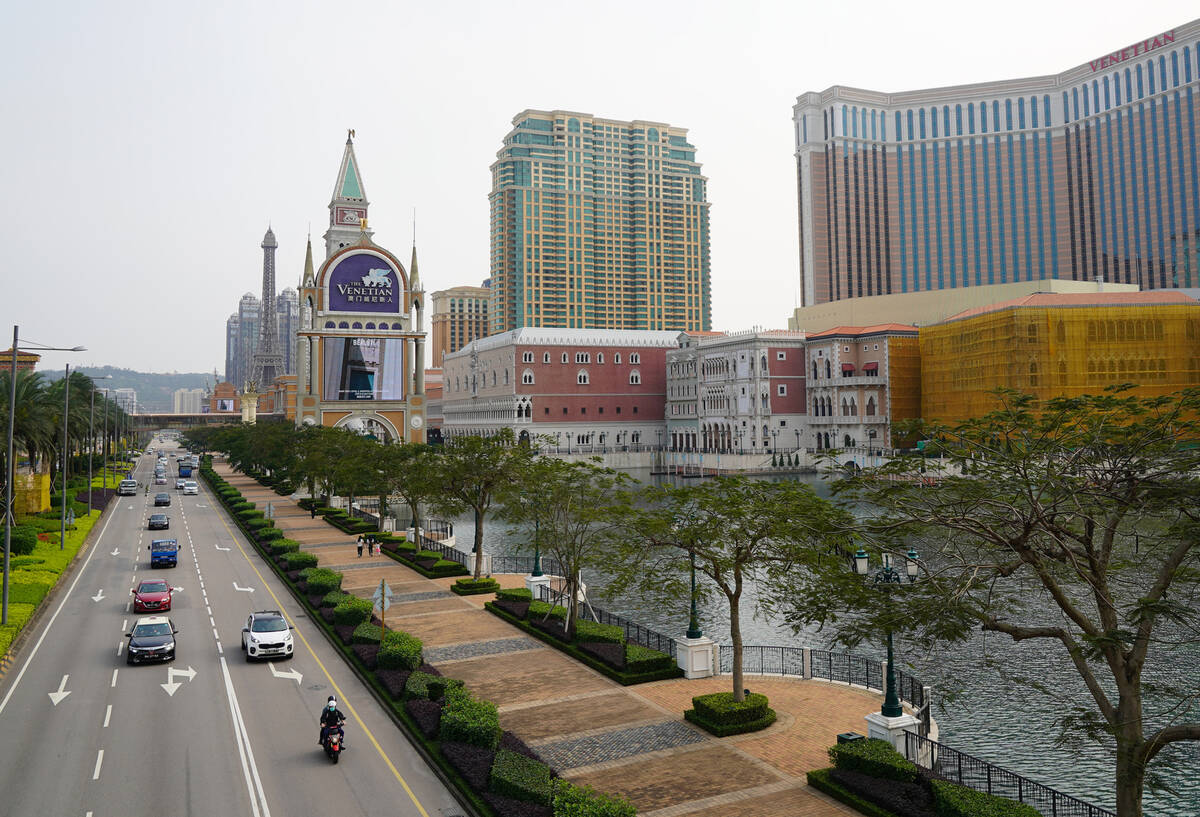Las Vegas Sands sees Singapore rebound; Macao struggles continue
COVID-19 pandemic restrictions continue to hurt Las Vegas Sands Corp.’s financial position in Macao, but visitation to Singapore is starting to rebound, company officials said Wednesday in an earnings call with investors.
Revenue declined by 16.3 percent in the first quarter for Sands compared with last year, and the company continued to show net losses.
Border crossings into Macao have been closed on and off for the past two years as a measure to slow the spread of the coronavirus and in some cities entire communities have been locked down, preventing travel to the only place in China where gambling is legal.
“While pandemic-related restrictions continued to impact our financial results this quarter, we were able to generate positive cash flow at Marina Bay Sands in Singapore, and for the company as a whole,” said Rob Goldstein, chairman and CEO of the Las Vegas company.
“We remain enthusiastic about the opportunity to welcome more guests back to our properties as greater volumes of visitors are eventually able to travel to Macao and Singapore,” he said. “We also remain steadfast in our commitment to supporting our team members and to helping those in need in each of our local communities as they recover from the impact of the COVID-19 pandemic.”
First-quarter slump
Macao gaming revenue slumped to an 18-month low in March, according to Macao’s Gaming Inspection and Coordination Bureau.
For the first quarter of 2022, Macao’s 41 casinos generated $2.2 billion, 24.8 percent below the nearly $2.93 billion from the first three months of 2021.
Sands made a major commitment to rely on Macao a year ago when the company announced it was selling its Las Vegas assets to Apollo Global Management Inc. and Vici Properties Inc. for $6.25 billion.
That deal closed on Feb. 23, 2022, and the company received around $5.05 billion in cash proceeds, before working capital adjustments, transaction costs and income taxes. In addition, the company provided $1.2 billion in seller financing in the form of a six-year secured term loan.
Goldstein said the sale provided the company with “liquidity and optionality” for future corporate moves.
Meanwhile, the market is rebounding in Singapore, where the company operates the iconic Marina Bay Sands resort.
Singapore rebounding
“There’s full access in Singapore and quarantine-free entry to the country,” Goldstein told investors. “We’re back in business in Singapore in a really big way.”
In a question-and-answer session with investors, Goldstein also reiterated the company’s desire to develop integrated resorts with hotels, casinos, restaurants, entertainment and convention facilities in Texas, New York and Florida, but he provided no new or additional details.
“We failed recently in Florida, but we’re not done with that,” he said.
Goldstein was referring to efforts by Florida Voters in Charge, a nonprofit political action committee funded by Sands, to gather signatures on petitions supporting the legalization of commercial gambling in northern Florida. The PAC ended its efforts to put an initiative on November’s ballot earlier this month.
Goldstein also was asked about potential locations for a New York casino, but he said it was too early to be contemplating sites in that state.
‘We do not see much more downside’
Sands President and Chief Operating Officer Patrick Dumont told investors it was too early to detail strategies for online gambling and the company’s investments in digital production companies.
For the first quarter, Sands reported a net loss of $302 million, 49 cents a share, on revenue of $943 million for the period that ended March 31. In the same quarter a year earlier, Sands posted a net loss of $96 million, 28 cents a share, on revenue of $1.126 billion.
Joe Greff, a gaming analyst with New York-based J.P. Morgan, said Macao’s downside appears to be bottoming out.
“While we cringe writing this next sentence, we do feel it is more likely than not that Macao is bottoming both from a fundamental point of view as well as from a share price and investor sentiment point of view,” Greff wrote in a report to investors. “It can get worse for sure, but with marketwide visitation in the first quarter at 18 percent of pre-pandemic levels, we do not see much more downside.”
Las Vegas Sands shares, traded on the New York Stock Exchange, rose 9 cents, 0.3 percent, to $34.84 a share in light trading. After hours, shares continued to rise by 26 cents, 0.75 percent, to end at around $35.10 a share.
The Review-Journal is owned by the Adelson family, including Dr. Miriam Adelson, majority shareholder of Las Vegas Sands Corp., and Las Vegas Sands President and COO Patrick Dumont.
Contact Richard N. Velotta at rvelotta@reviewjournal.com or 702-477-3893. Follow @RickVelotta on Twitter.
Las Vegas Sands Corp.
First-quarter revenue and earnings for Las Vegas-based Las Vegas Sands Corp., operators of resorts in Macao and Singapore. (NYSE: LVS)
Revenue
1Q 2022: $943 million
1Q 2021: $1.126 billion
Change: -16.3%
Net (loss)
1Q 2022: ($302 million)
1Q 2021: ($96 million)
(Loss) per share
1Q 2022: ($0.49)
1Q 2021: ($0.28)






























